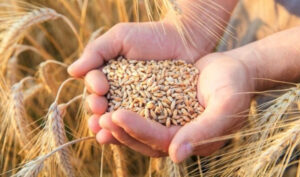
Ukraine in the 2022-2023 marketing year (MY) harvested 70 million tons of grain and managed to export two-thirds of the harvest planned for export even taking into account the record high transitional residues, Minister of Agrarian Policy and Food Mykola Solskiy said on air of the marathon “United News”.
“Last year we harvested only about 70 million tons. All that we planned to take out, we took out. This is about two-thirds. We have transitional residues by the beginning of July – several million tons. If we compare it with the transitional residues last year, it is several times less – it was 22 million tons then. This is due to the fact that we were not traveling for a couple of months and had a huge harvest in 2021,” he explained.
Solsky recalled that in May in the Ministry of Agrarian Policy predicted that this year’s grain harvest will be 10% lower than last year. However, now the expectations have changed and the Ministry expects that the grain harvest will be less by about 6% due to favorable weather conditions.
“Agrarians have decided to sow corn not in the same volume (as before – IF-U), but to sow more sunflower and soybeans. It can be the same income in money, but the logistics costs are less and it is necessary to deal with it less, because conditionally the yield of corn per hectare is two to three times higher than that of soybeans and sunflowers,” the minister explained.
Solsky noted that farmers are not accustomed to difficulties and expressed confidence that Ukrainian farmers will cope with the challenges that constantly arise before them.
The minister called the main problem of Ukrainian farmers not difficulties with the realization of the produced products, but with the price for them.
“In the coming months, the work of everyone related to the state authorities will be related to the fact that they (agrarians – IF-U) will be able to sell expensively. This has to do with reducing logistics costs, with expanding opportunities, where it can go, to which countries to sell,” he summarized.
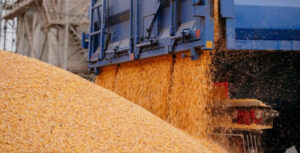
Transit of Ukrainian grain through Poland is steadily growing: if in February it was 114 thousand tons, in June it exceeded 260 thousand tons, Polish Minister of Agriculture and Rural Development Robert Telusz said after online talks on Wednesday with Ukrainian Minister of Agrarian Policy Mykola Solskiy.
“This is very good news for agrarians, because grain from Ukraine does not enter the Polish market,” the Polish minister was quoted as saying in a tweet and on the ministry’s website.
At the same time, he said he saw a chance for the European Commission to extend the decision to ban Ukrainian grain exports to Poland after September 15, blaming both those in power in the EU and the Polish opposition for trying to destabilize Poland.
“It is in our interest to protect the Polish farmer. That is why a clear statement was made by Prime Minister Morawiecki that Ukrainian grain will not enter Poland after September 15,” Telusz reiterated.
According to him, the Polish side wants the so-called “solidarity corridors” to work effectively, which would allow for efficient transportation of Ukrainian goods without harming the Polish agricultural sector.
A press release from the Polish ministry indicates that to this end Telusz proposed measures to facilitate the transit of Ukrainian grain to seaports in various EU countries, in which Solsky was interested, but no other details are available and the Ukrainian ministry has not officially commented on the talks.
The Polish Ministry of Agriculture said that the Ukrainian side will also present a draft of detailed solutions in the near future. “He (Solsky – IF-U) explained that Russian missile strikes on Ukraine’s port infrastructure have put Ukrainian exporters in a very difficult situation. Now they will have to organize grain exports via other routes,” the release said.
Telush informed about ongoing negotiations with Lithuania and Latvia on the use of their ports for grain exports from Ukraine. “These negotiations are going in the right direction,” the minister added.
According to him, Poland has managed to significantly increase grain exports through its four main ports this year. In particular, if in January it amounted to 299 thousand tons, in February – 539 thousand tons, in March – 628 thousand tons, in April – 704 thousand tons, in May – 882 thousand tons, and in June – almost 940 thousand tons.
Poland exported more than 4.5 million tons of crops in 4 months of this year, stated Telusz.
It is noted that the ministers also raised the issue of access of Polish poultry products and eggs to the Ukrainian market, and currently the veterinary services of both countries are working intensively to resolve this issue.
The Polish Ministry of Agriculture pointed out that Ukraine is an important partner of Poland in agri-food trade. In 2022, an increase in agricultural exports to the Ukrainian market by 16% to $945.3 million was recorded. The main export items were: cheese and cottage cheese, products used for animal feed, and coffee. In April 2023, exports of agricultural products to the Ukrainian market increased by more than 35% compared to the same period in 2022, the release added.
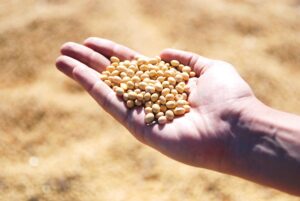
Agro-industrial holding Astarta, the largest sugar producer in the country, exported 833 thousand tons of products to 40 countries during the 2022-2023 marketing year (MY, September-August) under conditions of limited logistical opportunities.
“Despite the constant blocking of Russian maritime trade routes and other export restrictions, we managed to deliver to foreign markets and 563 thousand tons of grains and oilseeds, including 177 thousand tons of wheat and 386 thousand tons of corn. Italy, Spain, Indonesia and Kenya became the main importers of wheat, and China, Portugal and Spain – corn,” – reported the press service of the holding in Facebook.
According to the company’s data, the main consumers of soybean products during this period were EU countries, where Astarta supplied 48 thousand tons of soybean oil and 133 thousand tons of soybean meal, taking the second and first place among exporters of these products to the EU, respectively.
In addition, the holding also supplied 52 thousand tons of sugar to European markets, which also allowed Astarta to maintain its leading position among Ukrainian exporters.
“Due to our properly built reputation, transparency and consistency of business, we were ready for integration into European markets with both our main products and niche products. Incidentally, the niche ones, including organic flax and mustard, were one of the discoveries last season. It was their presence in our product portfolio that allowed us to work with both major and regional players in the European Union,” said Astarta’s commercial director Vyacheslav Chuk, whose words are quoted in the report.
He added that Astarta plans to deepen trade relations with key European partners and develop a product line under its own brand.
“Astarta” is a vertically integrated agro-industrial holding operating in eight regions of Ukraine. It includes six sugar factories, agricultural farms with a land bank of 220 thousand hectares and dairy farms with 22 thousand cattle, an oil extraction plant in Globino (Poltava region), seven elevators and a biogas complex.
In the first half of 2023, Astarta’s revenue from sales of key products increased by 64.8% year-on-year to UAH 10.72 bln. The main contribution was made by sales of sugar – UAH 3.27 bln, which increased by 75.5%, corn – UAH 2.66 bln (+53.2%) and soybean meal – UAH 1.96 bln (+84.5%).
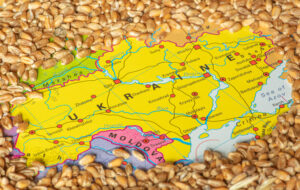
The United States will support Ukraine’s grain exports to markets that desperately need them, White House press secretary Karine Jean-Pierre said during a briefing.
“We are going to continue to support Ukraine’s efforts to get Ukrainian grain to markets that desperately need it,” she said.
The spokeswoman also noted the provision of U.S. financial support and supplies for Ukrainian farmers, such as seeds and fertilizer, as well as assistance with crop storage and processing.
In addition, Jean-Pierre recalled that the U.S. government is providing Ukraine with $250 million in financial assistance to support the agricultural sector.
“The United States will allocate another $250 million to the AGRI Ukraine initiative to help Ukrainian farmers produce, store and export agricultural products and grain to global markets,” she emphasized.
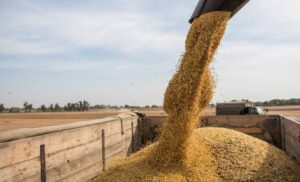
Exports of grain crops through the four main Polish seaports in MY 2022-2023 (July 2022-June 2023) exceeded 6.6 million tons, 70% more than in the previous MY, when almost 3.9 million tons were exported, said Marcin Wroński, deputy head of Poland’s National Center for Support of Agriculture (KOWR).
“The very large increase in grain exports by sea – by 70% – in the 2022/2023 season was made possible by the fact that in order to solve the problem of grain surplus on the domestic market, the Polish government took measures aimed at improving logistics and transportation capacities,” Marcin Wroński was quoted as saying by Polish publication farmer.pl.
Financial incentives for farmers in the form of grain subsidies also played a major role, which had an impact on export volumes through the Baltic Sea berths, which have been growing month by month, explained the deputy head of KOWR.
According to him, in the 2022/2023 season, wheat was mainly exported through the national seaports – more than 4.4 million tons compared to almost 2.1 million tons a year earlier, as well as corn – more than 2 million tons compared to about 1.3 million tons in the previous season. 74,000 tons of triticale, 68,000 tons of rye, 64,000 tons of barley and 16,000 tons of oats were also shipped through Baltic ports.
Wroński noted that grain was exported mainly through the seaport in Gdynia – 52%, or 3.5 million tons. Another 31% of the volume, or 2 million tons was shipped through the port of Gdansk. Exports through the seaport of Szczecin-Swinoujście amounted to 17% – about 1.1 million tons of grain.
“May and June (2023 – IF-U) were record months for grain exports by sea: in May we exported 882 thousand tons of grain through ports in Gdynia, Gdansk, Swinoujście and Szczecin, and in June this figure reached 937 thousand tons. We have never had such a result as in June,” emphasized the deputy head of KOWR.
He added that grain exports were also carried out through smaller ports, such as Kolobrzeg, so the total grain exports through the ports in June approached 1 million tons.
According to KOWR’s calculations, in the 2022/2023 season grain exports through sea, road and rail channels totaled more than 11 million tons, which was a record result in the history of Polish grain trade.
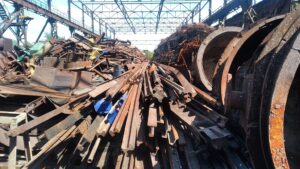
Enterprises for operations with ferrous scrap in January-June of this year reduced scrap metal procurement by 25.2% compared to the same period last year – up to 531 thousand tons.
As reported in the operational information of the Ukrainian Association of Secondary Metals (“UAVtormet”) on Wednesday, the export of scrap metal for the period amounted to 92 thousand tons compared to 28.7 thousand tons in January-June-2022 (growth in 3.2 times). At the same time, import of scrap amounted to 0.5 thousand tons, while in the first six months of last year it amounted to 1.6 thousand tons.
Scrap deliveries to the country’s steel enterprises in January-June 2023 decreased by 37.2% compared to January-June 2022 – to 413.8 thousand tons from 659.4 thousand tons.
As of July 1, 2023, the level of scrap metal stocks at Ukrainian metal enterprises was estimated at 15-20 thousand tons.
As reported, Ukraine in 2022 reduced scrap procurement by 75.9% compared to 2021 – to 996.7 thousand tons from 4.136 million tons. Scrap metal exports last year amounted to 53.6 thousand tons, which is 11.5 times less compared to the previous year (615.7 thousand tons). At the same time, scrap imports amounted to 1.8 thousand tons (23 thousand tons in 2021).
Scrap deliveries to the country’s metal enterprises in 2022 decreased by 73% compared to 2021 – to 895.7 thousand tons from 3 million 323.4 thousand tons.
“UAVtormet” forecasts in 2023 the procurement of ferrous scrap in the amount of 1.2-1.25 million tons. In addition, scrap deliveries to the country’s metal enterprises are forecast to amount to 950-1000 thousand tons. Export of scrap metal is expected to amount to 180-200 thousand tons, import – 0.2-0.5 thousand tons. Steel output is expected to be 4.8-5.2 million tons.